Pulse Points: Healthcare's Hiring Heartbeat - Who's In, Who's Out This Month

The healthcare industry has experienced a dynamic start to the year, with significant leadership changes and workforce shifts marking January's landscape. Major health tech companies and medical providers have been particularly active, showcasing notable executive movements and organizational restructuring.
Prominent medical technology firms like Medtronic and athenahealth have bolstered their leadership teams by bringing in fresh C-suite talent, signaling strategic growth and innovation. Simultaneously, renowned healthcare providers such as Cleveland Clinic and Jefferson Health have implemented workforce reductions, reflecting the ongoing economic and operational challenges facing the healthcare sector.
These developments underscore the continuous transformation within healthcare, highlighting the industry's adaptability and responsiveness to changing market dynamics. As organizations navigate complex economic environments, strategic leadership changes and workforce adjustments remain critical to maintaining competitiveness and operational efficiency.
